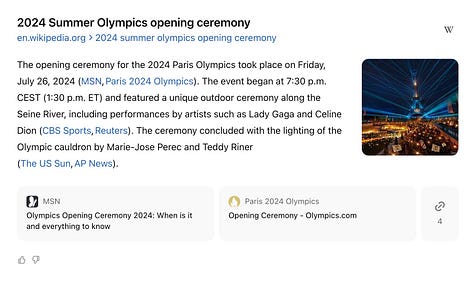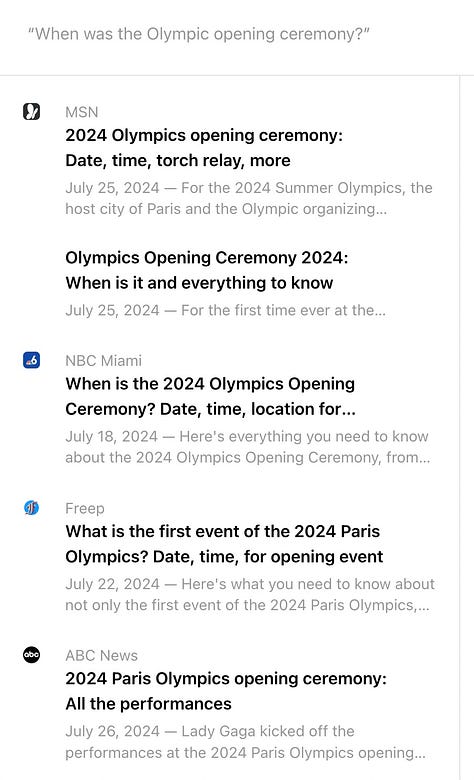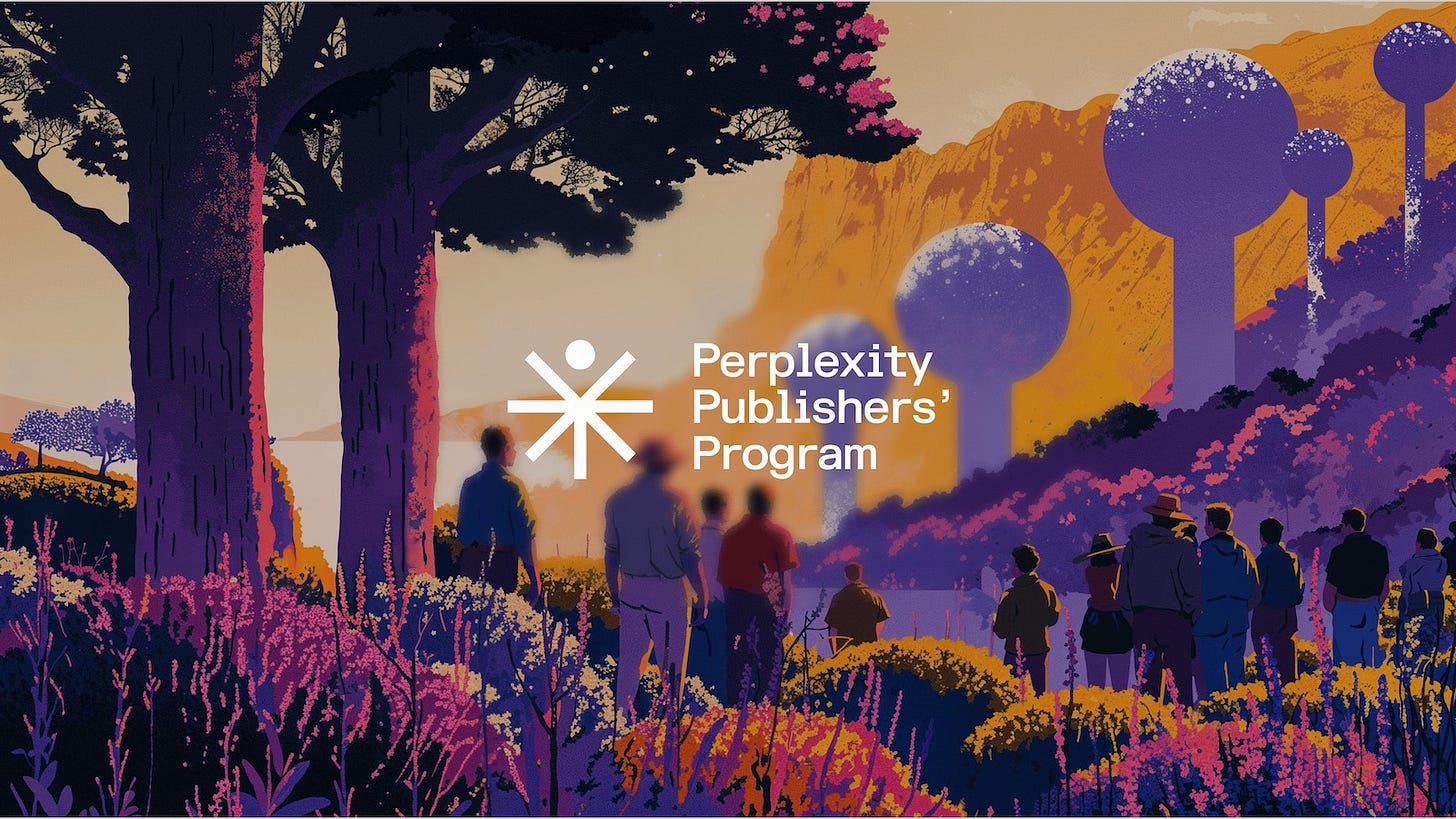The SearchGPT Paradigm
What people (still) fundamentally misunderstand about AI search.
OpenAI's recent launch of SearchGPT has seemingly marked a new competition in the "AI-powered search engine" space. The company put out a waitlist last Friday and has only granted access to a few thousand users.
Over the weekend, I became one of them.
After a few days of testing, I've had the opportunity to compare SearchGPT with competitors like Perplexity and consider its implications for the future of search in the AI era.
What is SearchGPT?
For months, the media has speculated about an AI-powered search engine from OpenAI. It was originally "supposed" to launch in May, and we finally got a glimpse of the new product last week.
At first glance, SearchGPT is a search box. Once you ask a question (or type a statement), you're met with a quick answer that includes inline source attribution, optional images, and a detailed source breakdown. Unlike traditional search engines that provide a list of links, SearchGPT offers a conversational interface that directly answers queries with cited sources, bridging the gap between search engines and AI assistants.



From what I can tell, SearchGPT is a version of ChatGPT that can 1) pull from an index of internet articles and 2) cite its sources as it generates responses.
In releasing SearchGPT, OpenAI made it clear that it's a prototype, not a product - and that's a pretty accurate description. It's got a very minimalist design without too many "product-centric" features, such as viewing your search history or auto-suggesting follow-up search terms.
There are also some rough edges, like a search for "Llama 405B vs Mistral Large 2" returning answers for "Llama 2 vs Mistral 7B" - though OpenAI patched that one pretty quickly after I brought it to their attention.
Just from looking at the UI, you wouldn't guess that pages and pages are being written about how momentous this launch is. Many see it as a warning shot from OpenAI to Google; a sign, perhaps, that they're coming after the search giant's billion-dollar money printer.
I’m (still) not convinced that ChatGPT will kill Google. But I think that’s because people fundamentally misunderstand the point of AI-based “search engines.”
Why is SearchGPT?
One thing that I've found endlessly fascinating is how people react when first presented with an LLM. Even when told what the tool can do, many people struggle with what to say to it. And of those that do figure something out, the first instinct is to treat it like a search engine.
That, I think, is what sets up this framing of OpenAI vs Google. I’ve talked about this before:
When people were first exposed to ChatGPT, they struggled to figure out what to say to it. Given that it was a chatbot, though, they got around to asking it questions about the world. And to their surprise, it gave human-sounding answers - far better than any chatbot that had come before it.
From there, it was easy to see how large language models like ChatGPT could upend the entire way we search the web. For the past twenty-something years, we've been living in Google's world of ten blue links. But what if we stopped dealing with links entirely? What if we could ask ChatGPT, or Bing, or whoever - and get back an answer? Would Google come out on top of that paradigm shift? And if they did, what would happen to their multi-billion dollar money printer - the ads they place above those ten blue links?
But this world model dramatically oversimplifies how people use Google. In many cases, maybe even most, people are looking for answers. They want a piece of information, but don't really care where it was sourced. Other users, however, want a destination, a specific article or brand. Still more want a product, or a way to easily buy one.
Google has understood this for a long time, and we've seen it play out in their ever-changing and sometimes frustrating above-the-fold section: shopping tiles, knowledge panels, and now AI-driven answers. It's difficult, if not impossible, for ChatGPT to compete on all these fronts in its current format.
But that's why it's wrong to think of SearchGPT as a standalone Google competitor - it's not. It's a new set of skills that lets ChatGPT cite its sources and stay up to date on current events. Much like asking ChatGPT to draw you a picture will summon DALL-E, asking for the weather or latest sports scores will summon SearchGPT.
Traditional search engines and LLM assistants have fundamentally different UX patterns. Google was designed to send users elsewhere as fast as possible; ChatGPT is designed to generate responses as helpfully as possible. This shift in user interaction could significantly impact how we consume information, potentially leading to longer, more in-depth engagements with AI assistants rather than quick jumps between websites.
And whether or not you’re excited about this chat-based future, it does bring up another question: how are AI-enabled search engines going to make money?
We need new business models for LLMs
If (and it's a big if) LLMs do replace traditional search engines, who is footing the bill? We know running ChatGPT costs millions of dollars per day, and OpenAI may be on track to lose billions this year. Investors and consumers alike are starting to doubt whether AI's mega funding rounds are justifiable. And though there is some potential revenue through ChatGPT Plus subscriptions, the vast majority of users are still on the free plan.
That's why Perplexity is figuring out a new business model, in the form of a Publishers Program. Advertisers can pay to have "related follow-up questions" (i.e. ads) show up after a user completes a query. At the same time, "partners" (i.e., media outlets) are paid whenever their content appears alongside a sponsored follow-up. While it's not a wildly different model for advertisers (presumably, you're targeting keywords and supplying something resembling ad copy), it's a brave new world for publishers.
Legacy search engines paid publishers exactly zero dollars, but in exchange, they funneled clicks and eyeballs that could be monetized downstream. Now, AI "search" is hoarding the user's attention, but it might compensate by paying a dollar amount instead.
Is this better? I don't know!
On the one hand, it's unlikely to be a meaningful amount of money anytime soon. And if does take off (meaning Perplexity becomes a major player in the consumer search space), it seems like it would suffer from the same issues as Spotify's business model - the biggest publishers vacuum up most of the attention and dollars, leaving smaller creators with scrapes.
On the other, it's a way for content creators to potentially monetize from AI products regurgitating their words and images, which is a first. And it's worth giving kudos to Perplexity for at least trying a new business model1. Especially one that comes closer to aligning the incentives of publishers and tech companies. As AI companies continue to scrape the web, publishers have increasing incentives to put up paywalls.
“It’s a much better revenue split than Google, which is zero."
– Matt Mullenweg, CEO of Automattic
In comparison, OpenAI has cut deals to license training content and prioritize traffic back to its partners but has no plans to share revenue from SearchGPT conversations. Likewise, Google doesn't monetize or offer payouts for its AI-generated answers. That said, it’s likely these policies will change, especially as the backlash to AI scraping grows.
Answers and questions
As AI-powered search tools like SearchGPT continue to evolve, we stand at a crossroads in how we interact with information online. The shift from traditional search engines to conversational AI assistants promises more efficient access to knowledge, but it also raises important questions about the future of content creation, monetization, and the very nature of online engagement.
Are we losing something important and immeasurable by running all our consumption through an AI? Do we run the risk of “dumbing ourselves down” as we increasingly rely on automated summarization? Does any of this even hold together financially without billions of VC funding?
The journey from ten blue links to AI-driven conversations is just beginning, and its destination remains to be written – not by algorithms alone, but by the collective choices of users, builders, and publishers in the next era of the Internet.
It certainly comes at a useful time - Perplexity is still dealing with the fallout from recent allegations of plagiarism.







This article is really underrated; I think you perfectly captured both the strengths and weaknesses of AI search and the big question at the heart of it: who’s willing to pay for it?
I don't think Perplexity is going to survive. They haven't reached 10 million downloads on Android yet, whereas Openai as 100 million plus downloads. Real time search is an adjacent use case of a chatbot. I wrote an article recently explaining why your product should not look like a chatbot. Furthermore, build a product that can't be replicated inside a chatbot interface.
In a market where two competitors are building a relatively similar product, the company with superior distribution wins.
Perplexity is a chatbot with search. Openai has added search. Distribution wins.
Check out the article to understand the remaining 3 strategies
https://theriseofai.substack.com/p/ai-is-eating-software-how-to-build